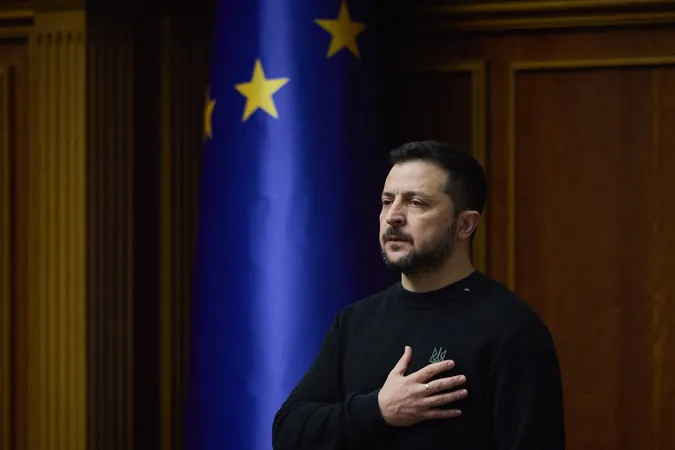
Shocking Proposal: Zelensky Offers Temporary Territory Concession for NATO Membership
2024-11-30
Author: Ken Lee
Ukrainian President Volodymyr Zelensky has stirred controversy by suggesting a potential temporary cession of Ukrainian territory to Russia in exchange for NATO membership. This bold move, aimed at halting the ongoing conflict, could alter the dynamics of the war that has been raging since Russia's full-scale invasion in February 2022.
Speaking to Sky News, Zelensky emphasized the importance of NATO covering the unoccupied parts of Ukraine, arguing that such a step is crucial to end the "hot phase" of the war. He indicated that he may accept that eastern regions, currently under Russian control, might remain outside the membership deal for the time being. This sentiment aligns with recent discussions regarding U.S. President-elect Donald Trump's purported strategy for resolving the conflict, which includes Ukraine potentially conceding territories already taken by Moscow in exchange for NATO's protective umbrella.
"If we want to stop the hot phase of the war, we need NATO to back the territories under our control," Zelensky stated. "It’s imperative to act quickly. We can address the occupied territories later through diplomacy."
He underscored the urgency of NATO support: "Without it, Putin will likely come back at us with renewed aggression." This urgency follows months of escalating military tensions and ongoing negotiations that have often teetered on the edge of breakdown.
Zelensky also expressed his willingness to cooperate with Trump's administration, stating, "We must work closely with the new president to ensure that Ukraine has the strongest possible ally." He mentioned the need for open communication, suggesting that various advisers around Trump might complicate or undermine their strategic dialogue.
Historically, Zelensky has reiterated Ukraine's stance on its territory, particularly concerning Crimea, which was unlawfully annexed by Russia in 2014. In September 2022, Russia declared the annexation of several Ukrainian regions—Donetsk, Kherson, Luhansk, and Zaporizhzhia—following referendums that were deemed illegitimate by the international community.
Despite this tentative shift in rhetoric, Zelensky's long-established position remains that these territories are and should remain part of Ukraine. The country's renewed commitment to reclaiming all occupied land will undoubtedly shape future discussions in the hopes of achieving a lasting peace.
As Ukraine navigates these complex discussions, the world watches closely, curious about how this proposal might impact regional stability and international relations moving forward. Will Ukraine's strategic concession pave the way for peace, or will it embolden further territorial ambitions from Russia? Only time will tell.

 Brasil (PT)
Brasil (PT)
 Canada (EN)
Canada (EN)
 Chile (ES)
Chile (ES)
 España (ES)
España (ES)
 France (FR)
France (FR)
 Hong Kong (EN)
Hong Kong (EN)
 Italia (IT)
Italia (IT)
 日本 (JA)
日本 (JA)
 Magyarország (HU)
Magyarország (HU)
 Norge (NO)
Norge (NO)
 Polska (PL)
Polska (PL)
 Schweiz (DE)
Schweiz (DE)
 Singapore (EN)
Singapore (EN)
 Sverige (SV)
Sverige (SV)
 Suomi (FI)
Suomi (FI)
 Türkiye (TR)
Türkiye (TR)